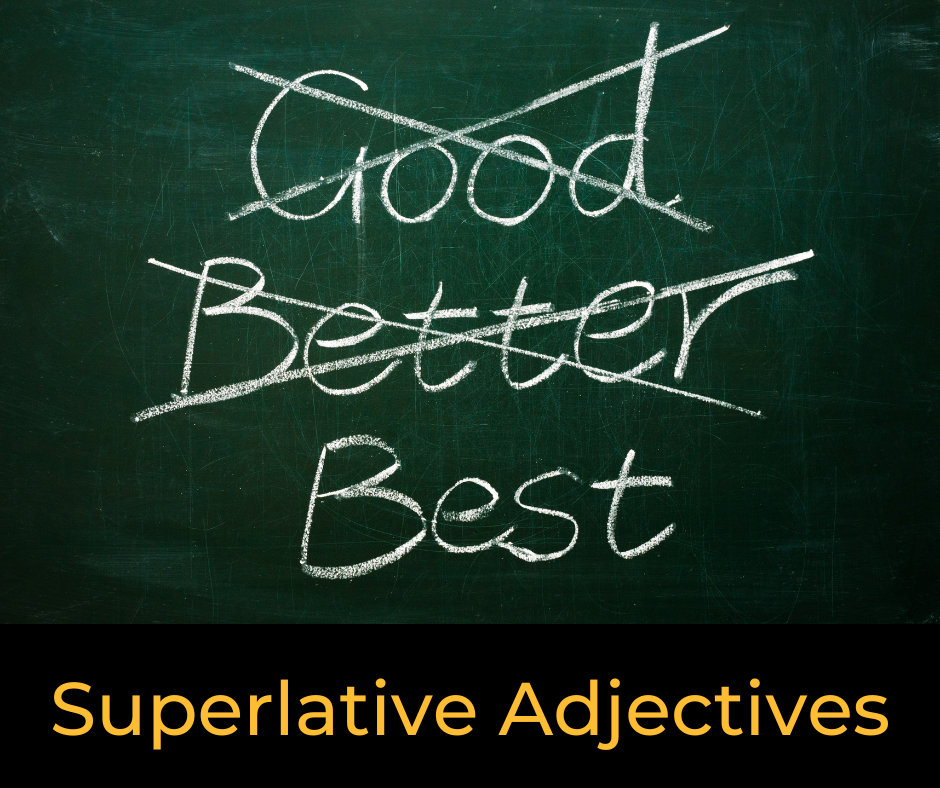
In this podcast, you’ll learn how to use superlative adjectives so that your English grammar will be THE BEST!
Voice message from Jesús
Renting a Place to Live: https://inglespodcast.com/438
It was Xwrite downX written down in a contract
Is there is tax for collecting rubbish?
Council tax – for rubbish collection, libraries, police and fire brigade, transport, street lighting, and road maintenance.
How much Council Tax you pay depends on:
- your personal circumstances
- which valuation band your property is in
- how much the council needs to fund its services.

Improve your speaking fluency with Craig
https://www.englishmasterclass.net/
Superlative adjectives
If you haven’t listened to last week’s podcast about comparative adjectives, it’s a good idea to listen to that before this episode https://inglespodcast.com/453
Superlative adjectives are used to describe a thing or person which is at the upper or lower limit of quality (the highest, the smallest, the cheapest, the best).
We often use superlative adjectives when talking about three or more things (not two things).
As with comparative adjectives, there are two ways to form a superlative adjective:
short adjectives: add “-est” – fastest, happiest, nicest
long adjectives: use “most” – most expensive, most intelligent, most uncomfortable
past participle adjectives, short or long: use “most” – most tired, most used, most copied
The opposite of most is least: the least expensive, the least intelligent
We often use ‘the’ with superlative adjectives:
You’re the greatest!
They’re the most hardworking students in the class. (NB ‘in’, NOT ‘of’)
The most expensive hotel (that) I’ve ever stayed in was in Monaco.
(We often omit ‘that’ in a superlative sentence.)
It’s the tastiest meal (that) I’ve had in a long time.
We don’t use ‘the’ when there is a word like ‘my’, ‘her’, ‘our’ etc, or Reza’s:
He’s my best friend.
That’s our most valuable possession.
Craig is Reza’s oldest friend in Valencia.
With some 2-syllable adjectives, we can use “-est” or “most”:
quiet – the quietest/most quiet
clever – the cleverest/most clever
narrow – the narrowest/most narrow
simple – the simplest/most simple
There are also some irregular adjectives that you need to learn the irregular forms of:
good – better – best
bad – worse – worst
far – further (US farther) – furthest (US farthest) Further can be a verb. ‘To further my career.’
‘That couldn’t be further from the truth.’
little – less – least
much – more – most
fun – more fun – the most fun (NOT funner/funnest)
Discussion
What’s the most interesting country you’ve been to?
What’s the best concert you’ve been to?
What’s the least interesting work you’ve ever done?
Which type of cheese is the tastiest?
In your opinion, what’s the least difficult aspect about learning Spanish?
…and now it’s your turn to practise your English.
Send us a voice message. https://www.speakpipe.com/inglespodcast
Send us an email with a comment or question to [email protected] or [email protected]
This podcast is sponsored, in part, by mansionIngles.com. Visit the online store: https://store.mansioningles.net/
Thank you to all of you who are helping us by supporting this podcast on Patreon. Join our Patreon program for as little as $1.50 per month (+ VAT) and you get instant access to recent transcriptions. https://www.patreon.com/inglespodcast
Welcome to our new Patreon supporters who have joined us this month:
Chema De Lamo
Héctor Gómez Soria
Tomás
In next week’s episode: Stories from school
If you enjoyed this podcast, please tell your friends.
The music in this podcast is by Pitx. The track is called ‘See You Later’



